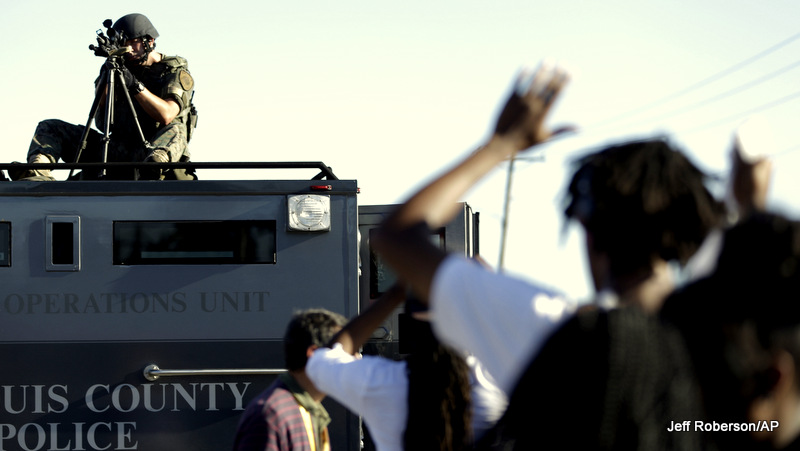
A member of the St. Louis County Police Department points his weapon in the direction of a group of protesters in Ferguson, Mo. on Wednesday, Aug. 13, 2014.
MINNEAPOLIS– With police brutality becoming a major issue in domestic politics, the debate between those critical of the police and those committed to supporting law enforcement officers has raged on, moving to the forefront of the nation’s attention every time an unarmed civilian loses their life to an officer.
However, a recent bill introduced in both houses of Congress by Senator John Cornyn (R-TX) and Representative Ted Poe (R-TX) has been accused of taking support for the law enforcement community to an illogical extreme, causing some concern that the measure could pave the way for government overreach and impunity for police officers throughout the country.
The bill, titled “The Back the Blue Act of 2017” (SB 1134/HR 2437), specifically targets Section 1983 of the U.S. Code, a rights protection statute that entitles the victims of illegal and unjustified police violence to be compensated for the harm they have suffered.
As it is currently written, the bill would limit the ability of victims to receive compensation, specifically if the victim had allegedly been involved in a felony or “crime of violence,” a term that includes offenses such as property damage.
The statutes of section 1983 have long been used as the primary means for everyday Americans to hold police and government officials accountable if their rights are violated.
With police already immune to legal punishment if their use of force is found to be “justified” – regardless of the officer’s intentions – along with the systemic elimination of citizen review boards intended to oversee local police departments, these statutes remain the last chance for victims of police brutality to hold officers accountable. As a result, the legislation has already drawn sharp rebukes from several prominent human rights organizations.
Back to Blue Act is actually Back to Dark Ages Act. Would dramatically expand cops’ immunity from brutality lawsuits https://t.co/PgUNuhLW74
— Ezekiel Edwards (@EzekielACLU) May 30, 2017
Reject Back the Blue Act: Police should pay when they break the law, same as everyone else. https://t.co/FA5XEHvTAN
— John Raphling (@JRaphling) May 24, 2017
“This bill would not protect police officers from danger. Instead, it protects police departments from accountability and removes important incentives for those departments to monitor themselves and improve the quality of their policing,” John Raphling, senior criminal justice researcher at Human Rights Watch, said in a statement.
In addition, the bill would make all assaults targeting law enforcement officers, even minor ones, federal crimes complete with severe mandatory minimum sentences. It would also expand the federal death penalty to include police killings, even in states that do not normally employ the death penalty. However, this would only be applicable to those officers whose departments receive federal funds.
The American Civil Liberties Union (ACLU) took major issue with the bill’s inclusion of mandatory minimum sentences. In a statement, they asserted that such sentences “are unnecessarily harsh, eliminate judicial discretion, create racial disparities, and force defendants into plea deals at the expense of their constitutional rights. In recent years, Congress has taken steps to mitigate the harms of existing mandatory minimum sentences, recognizing that ‘one-size-fits-all’ punishments are unjust and unequitable. The Back the Blue Act is a step backwards.”
Others have criticized the bill for attempting to extend federal overreach into state and local law enforcement. Former Texas state representative David Simpson, in an editorial, argued that the bill “would erode the independence and self-governance of our state required in Article I, Section 1, of the Texas Constitution and skirt the clear intent of Article I, Section 8, of the U.S. Constitution that limits the federal government from meddling in most matters of state government.”
The bill could also further endanger the rights of protesters, as they are often accused of assaulting police officers during protests, even when they are the actual victims of assault. In 2012, Occupy Dallas protester Stephen Benavides was pushed by an off-duty police officer working private security from a height of five feet.
However, Benavides was subsequently charged with assaulting the officer who pushed him, even though video footage taken at the scene disputes this. If the Back the Blue Act is passed, protesters in similar situations could find themselves facing heavy jail time for being the victim of assault only because of their assailant’s occupation.
Raphling asserted that the bill would ultimately do more to harm police officers than to protect them. “Under the guise of protecting officers, this bill would make police less accountable, which can only undermine their legitimacy with the communities they serve,” he concluded.
Read the full text of The Back the Blue Act:
Source Article from http://www.mintpressnews.com/congress-looks-to-reduce-police-accountability-erode-state-independence-with-new-bill/228376/
 RSS Feed
RSS Feed















 June 1st, 2017
June 1st, 2017  Awake Goy
Awake Goy 





 Posted in
Posted in  Tags:
Tags: 













